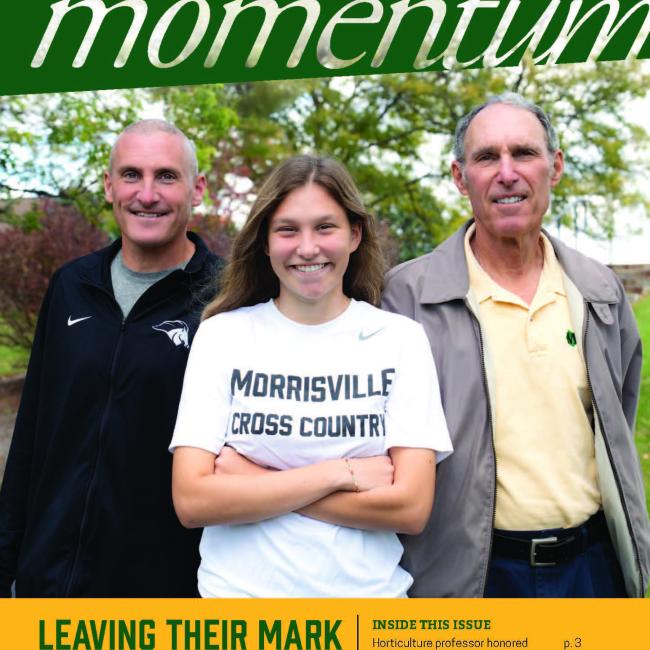When Barn Sis was donated to the racing program at Morrisville State College, driver Cole Wimmer wasn’t sure that the three-year-old trotting filly would be fast enough to compete on the New York Sire Stakes harness racing circuit.
“She’s tiny,” said Wimmer, a 2006 graduate of the college’s Standardbred racing program who now works for the college as an instructional support assistant.
But Wimmer and Barn Sis have been on a winning streak this year, taking first place at seven races at Vernon Downs and finishing strong at competitions at Monticello and Saratoga. Her earnings total $20, 170 this year for the Morrisville College Foundation, and she set a record finish time of 1:56 at an Aug. 17 race at Vernon Downs.
“She has a lot of heart, and I’ll take heart over size any day of the week,” Wimmer said. “Every time you ask her to do something, she does better than you expected.”
The Standardbred racing program at Morrisville State College has been raising champions since 1985, as part of the equine science and management program.
Home to the only half-mile harness racing track on a college campus in the nation, Morrisville State has developed a reputation of turning out quality graduates and Standardbred horses.
A two-year degree in racing management gives students hands-on experience in the breaking, care, training, conditioning and racing of Standardbreds and Thoroughbreds. Additional coursework includes breeding management, equine rehabilitation and farm and stable management.
And the college’s annual yearling sale is one of the largest in the Northeast, drawing buyers, sellers and trainers who often seek graduates from Morrisville State for internships and full-time positions.
The college plays a key role in the Standardbred racing industry in New York State, which creates a $336.4 million direct economic impact and accounts for more than 6,500 jobs, according to a 2013 industry study.
“It’s not just the horses at the track—it is their trainers, the veterinarians and the university where they are learning their skills,” said Alex Dadoyan, executive director of the Standardbred Owners Association of New York. “If you’re going to have a thriving industry, you need places for people to get started and learn.”
Students spend most of their time in the campus barns off Swamp Road¾just over three miles north of the main campus¾learning how to breed mares, care for foals and manage older horses in the pastures. Racing management students introduce the yearlings to a harness and bridle and train them on the track.
“Sometimes it goes smoothly, and sometimes we end up in the middle of the race track,” Wimmer said with a smile.
Trainer Keith Cluff recalled when Wimmer entered his first race in 2004. Three other students crashed their carts going into the first turn at the Lewis County Fair racetrack in Lowville; Wimmer stayed up and finished the race.
“They have to learn by doing it,” Cluff said. “It’s not something they can read about in a book or on the computer. It’s something they have to learn firsthand.”
Wimmer got more exposure during an internship at Winbak Farm, a 2,000-acre breeding operation in Maryland. The internships are a key component of the Morrisville curriculum, adding more hands-on experience to student résumés.
“You learn more if you drive a good horse,” Cluff said. “He worked for people who let him train good horses.”
Ann-Mari Daley of Vernon Downs purchased Spin Spanky Spin from the college’s yearling sale in 2006; the bay colt went on to win $237,950 during his career, with 130 lifetime starts and 23 wins.
Daley said she is always impressed with the training yearlings receive at Morrisville State.
“You buy from other stables, and they can be like wild mustangs,” she said. “The students have been with the yearlings since they bred the mare. They foaled the baby and raised them for their whole life. It makes a difference.”
During this year’s yearling sale, Kasey Mang, of Fort Plain, was preparing Hot Seat for the show ring. “He is special. He was my project yearling,” said the equine student who foaled the bay colt along with his half-sister.
“It is so great to see the students involved with the horses, because that will keep our industry going,” Daley continued. “They are the next generation.”
Breeding manager Erin Shantal, a 2003 graduate of the college’s equine science and management bachelor degree program, said she receives calls each week from stables across the country looking for interns and graduates.
“We have never had a student who couldn’t find a job,” Cluff said. “People want them.”

